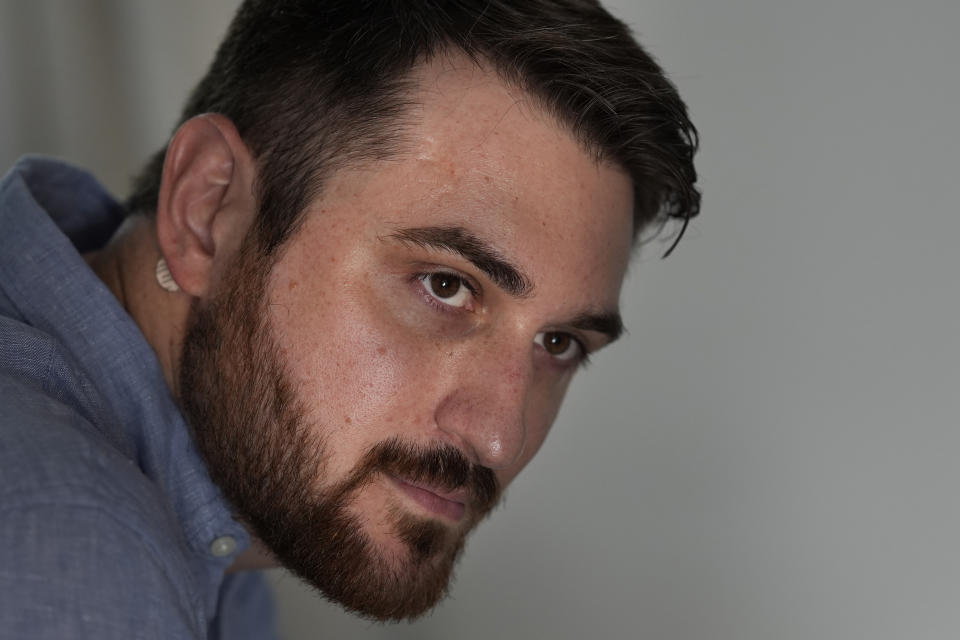Limits to anti-nausea pill coverage wear on cancer patients and doctors
Cancer patients can ward off waves of vomiting after treatment with a relatively cheap anti-nausea pill, but some are running into coverage limits.
Doctors say restrictions on the number of tablets patients receive can hurt care. Pharmacy benefit managers say their limits guard against overuse, and they offer workarounds to get more tablets.
In between sit patients, who might ration pills or opt for less effective help for a dreaded side effect of radiation or chemotherapy.
The conflict shows how an array of coverages and poor communication can complicate even simple acts of care in the fragmented U.S. health care system.
“This is sort of the dirty underbelly of the current health care environment,” said oncologist Dr. Fumiko Chino. “Insurance companies and pharmacy benefit managers are somehow weirdly ending up in my exam room, standing between me and my patients.”
Steven Manetta takes at least a half dozen pills daily to help keep a form of leukemia in remission. For more than a year, he rationed his go-to anti-nausea pill, ondansetron, known by the brand-name Zofran.
Manetta’s coverage through CVS Caremark paid for 18 ondansetron pills every 21 days. That forced him to sometimes use alternatives that make him extremely drowsy in order to stretch his supply. He only recently got approval for a 90-day supply.
“It’s just like an extra thing to think about all the time,” the 33-year-old Lemont, Illinois, resident said. “When you’re on so many medications, the ones with the least side effects are the ones you always want to reach for.”
Ondansetron hit the U.S. market more than 30 years ago. It was the first in a series of drugs that gave doctors a better way to control nausea and vomiting, said Dr. Alexi Wright, an oncologist who teaches at Harvard Medical School.
Wright and other cancer specialists call ondansetron a cornerstone treatment because of its relative safety, effectiveness and limited side effects.
The price doesn’t hurt either: Thirty tablets of ondansetron can cost under $12 through prescription discount websites.
Pharmacists and doctors say they've dealt with restrictions on anti-nausea drugs like ondansetron for years. Wright says she finds the limits “infuriating” in part because the drug is affordable.
More than half the plans sold on the U.S. individual insurance marketplace limit the number of ondansetron tablets that patients can get, according to preliminary results from a study by Chino and Michael Anne Kyle, a University of Pennsylvania researcher.
Pharmacist Yen Nguyen frequently sees these restrictions, including the limits from CVS Caremark that Manetta encountered.
“Over four or five months of chemotherapy, you’re fighting for dimes and nickels here," said Nguyen, executive director of pharmacy for the Houston-area practice Oncology Consultants.
Jennette Murphy paid cash for ondansetron when her cancer treatment started earlier this year because she couldn't get coverage for the amount her doctor requested. Then she got a letter telling her the drug wouldn't be covered.
“It freaked me out,” the Tehachapi, California, resident said. “I’m like, ‘Really? Have you ever been through chemo?’”
Pharmacy benefit managers say they set limits based partly on the treatment and offer several ways for doctors to request more.
Prime Therapeutics limits 4- and 8-milligram prescriptions of ondansetron to 21 tablets over 30 days. That helps provide “maximum dosing” for seven days of treatment a month, chief clinical officer David Lassen said in an email.
He said quantity limits are approved by independent doctors and pharmacists. They help prevent waste and excessive use that may not be safe.
CVS Caremark spokesman Mike DeAngelis said his company bases limits on Food and Drug Administration guidelines. He added that the company can make a decision on requests for more tablets in less than 24 hours.
Doctors say they don't always know when patients will need more.
Coverage limits vary, and some patients may not tell their doctor that they got a smaller-than-desired amount. Also, nausea intensity can be hard to gauge with newer treatments.
Chino says she wants patients to start with 90 tablets of ondansetron, enough to take the drug three times a day for a month if needed. But she often sees limits of 21 or 30 tablets.
“The fact that there’s still restrictive patterns on this very useful medication is insane,” said Chino, who recently moved from Memorial Sloan Kettering in New York to MD Anderson in Houston.
Limits can hurt patients who have big copayments for each refill or trouble getting to the drugstore, noted Dr. Ramy Sedhom, an oncologist and palliative care specialist with Penn Medicine Princeton Health.
“I have a lot of patients who only go to the pharmacy once a month when their niece or nephew is in town to pick up the (prescriptions),” he said.
If patients run out of ondansetron, even for a few days, uncontrolled vomiting can send them to emergency rooms or force a treatment pause, doctors say.
Murphy, the cancer patient, has avoided all of that. She said coverage started for ondansetron after her City of Hope cancer center doctor requested it.
She faces a stretch of chemotherapy cycles that will extend well into the fall. The treatments leave her bedridden for days with nausea even while taking ondansetron.
“I would hate to not have it,” she said.
___
The Associated Press Health and Science Department receives support from the Howard Hughes Medical Institute’s Science and Educational Media Group. The AP is solely responsible for all content.









